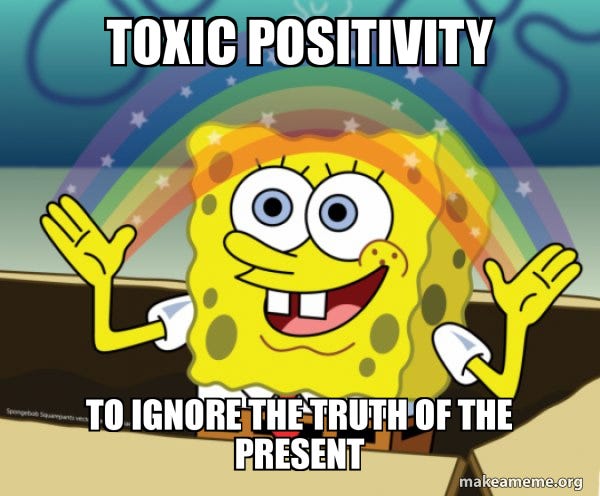Beyond Toxic Positivity
In many ways, it's the American religion. Are there more life-giving alternatives?
A few months ago, I was speaking to a group that was studying Hope: A User’s Manual. I try to do as much Q&A as possible in these venues—I’ve said my piece in the book, and I really want to hear what people are thinking about, bumping on, inspired by, etc.
One man took me to task for the section of the book called Hope Is Not Toxic Positivity. In that piece, I quote psychologist Susan David, who explains the concept thusly:
Being positive has become a new form of moral correctness. People with cancer are automatically told to just stay positive. Women, to stop being so angry. And the list goes on. It’s a tyranny. It’s a tyranny of positivity. And it’s cruel. Unkind. And ineffective.
Toxic positivity comes in many forms. I listed some in the book:
-silver linings (“At least you can get pregnant” after a miscarriage)
-vague assurances (“It’s going to be OK”)
-platitudes (“God never gives us more than we can handle”)
-minimizing (“Others have it so much worse than I do”)
This kind of chipper optimism is woven tightly into our culture, particularly in the U.S. It’s in the social media phrase “good vibes only.” It’s in the breakneck way we barrel through a rough patch and move on from grief as soon as possible. It’s in “the power of positive thinking,” which is practically a civic religion. It’s in our willful ignorance around mental health: as if depression were a moral failing and a product of laziness, curable by a brisk walk and brunch with friends. And faith people can be the worst about this. I recently heard this podcast unpack the concept of spiritual bypass, and I’m thankful for the terminology, but damned if I don’t see the concept everywhere now.
Anyway, this gentleman in the book group talked about a coworker who was “probably the most positive man I’ve ever met… he’s always cheering people up, giving them an encouraging word, and I always feel better after talking to him. Everybody loves him.”
I mean… the devil’s in the details, right? Perhaps this coworker has the emotional intelligence to know when such encouragement is legitimately appreciated, so he can deploy it thoughtfully. Or it could be the people around him gulp down his cheerfulness because it works well enough and they just don’t know there are more effective alternative medicines for the pains and adversities of life. Or maybe this coworker isn’t as universally adored as the man thinks. As he talked, I noticed a number of people cringing and squirming, perhaps because they’ve felt pummeled by people like this in the past.
Keep reading with a 7-day free trial
Subscribe to The Blue Room with MaryAnn McKibben Dana to keep reading this post and get 7 days of free access to the full post archives.



